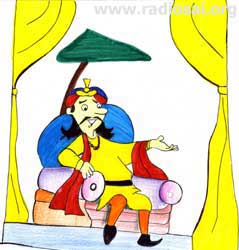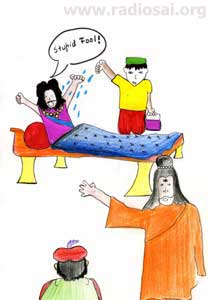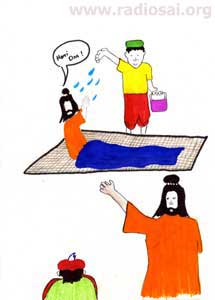|
|
Some time ago there reigned a king named Raja Singh Bhadur in Bihar. There was a large Ashram for Sannyasins in his kingdom at Anandapuri. Once the Ministers reported to the King that the Sannyasins and Brahmacharis (celibates) at the Ashram were always engaged in eating sweetmeats and kheer (pudding) and they feasted at least once a week. Most of their time was spent sleeping and they were not doing any austerities, spiritual practices or meditation.
The King sent a messenger to bring the Mahant, Swami Niralambananda, to his presence. On his entering the court, the King wasted no time and immediately confronted the Mahant with his complaint. "The ministers have reported to me that the Swamis and Brahmacharis are not doing any spiritual practice. They are only eating sweetmeats and sleeping." |
Swami Niralambananda did not appear upset at the King’s criticism. He smiled and replied “Your Majesty, we would be most honored if you would pay a visit to the Ashram in the early morning and you will learn the true facts. I will come and wake you up at three in the morning."
The King was satisfied with this answer, and so the next morning Swami Niralambananda went to the palace and woke the King at 3:00. He asked the King's attendant to take a pot of water along with them and on the Swami’s request they went first to the homes of the Ministers.
The Swami asked the attendant to throw water on the faces of the sleeping Ministers. They all woke up uttering, "You fool", "Damn nonsense," and "Who has disturbed my sleep?" The King was rather mystified and asked the Swami why this was all necessary. But the Swami persuaded him to accompany him to the stables and later to the ashram where all would be made clear.
At the stables the Swami asked the attendant to throw water on the faces of the grooms. They also woke up uttering, "Sala," "Badmash," etc.
Next the party proceeded to the Ashram. Water was then thrown on the faces of the Sannyasins and Brahmacharis, who all awoke uttering "Sivoham," "Hari Om," and "Ram, Ram." |
|
|
|
|
With a benevolent smile the Swami addressed the King. "Look, oh King! Have you noticed the difference? Have you noted the attitude, feeling and the words that came out of the mouths of these different kinds of people? The words reveal the contents of the heart and mind and show the culture of the person.
"Sadhus and Sannyasins also work and take food, but their attitude is very different. Worldly people judge persons by their external actions. Sannyasins take food for the maintenance of the body. They do not fill their stomachs to please the palate, to fatten themselves and indulge in sensual indulgence."
"They work as witnesses of their actions. They work for the good of the world. They know that hunger is a characteristic of the physical sheath and not of the Self or Atman. They do not identify themselves with the body, mind, Prana, senses or intellect."
The Swami went on to add, "They have no thought of the world. Their motives and thoughts are always pure. They have no thought of the morrow and they fill their minds with pure, sublime thoughts." |
"They never think: 'What will I get by doing this action? How much money will I make from this?' These thoughts never occupy their minds. They only think, 'How can I serve the world to the maximum degree? How can I make people ethical and religious-minded? How can I make them Yogis and Jnanis? How can I make them happy and wise?'
"They may appear to you to be sitting silently, as if Tamasic, but internally they are vibrant, radiant, full of purity and elevating thoughts. O King! Judge not people by external acts. Look to their motives and attitude."
“A Sannyasin," the Swami went on, "will not keep anything for himself. He will always share what he has with others. Whenever there is any calamity in the land, he will dedicate his life in doing such deeds as will relieve human suffering. He lives to serve. When the test comes to sacrifice life, you will discover the difference between a householder and a Sannyasin.
"As for feasts, they have no interest in them whatsoever,” the Swami laughed. "They always want simple food - dhal and bread. To bring auspiciousness and prosperity to the people, they arrange feasts at their sincere request."
"O adorable Swamiji" cried the King, "please pardon me. Now I understand the philosophy of motives and internal attitude. Your remarks have been illuminating and inspiring. Your instructions have opened my eyes. I was judging people only by their external actions. You have imparted inspiring knowledge to me.
"I shall be ever grateful to you, O revered Swamiji, crores of prostrations and adorations unto thee! Om Namo Narayanaya! Thou art my Guru from now on."
Adapted from Nava Sarathi July 2004.
Illustrations: Varun Rai, IX Class, SSSHSS
- Heart2Heart Team






